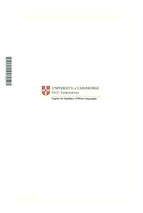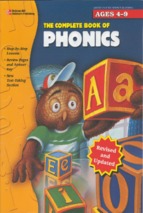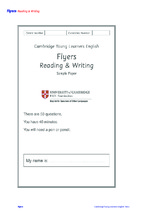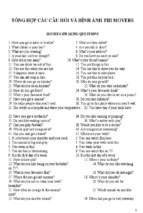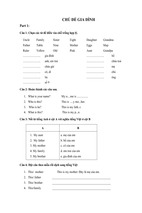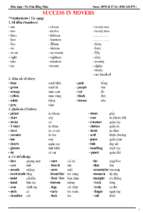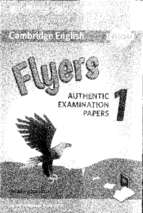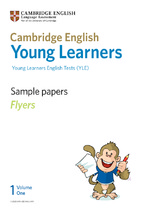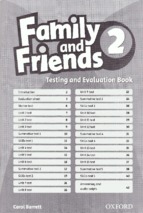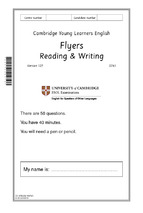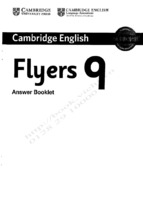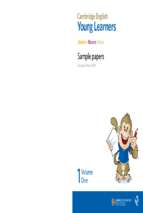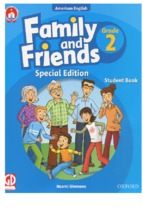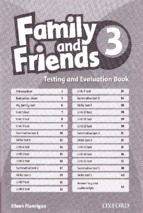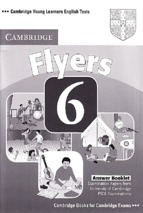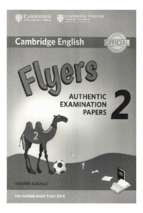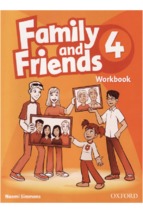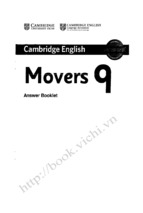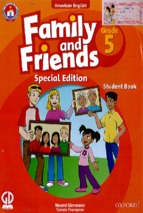Cambridge English
· Ad anc d
Student's Book -with Online Practice
Kathy Gude & Mary Stephens
OXFORD
UNIVERSITY PRESS
1
What are you like?
page 9
2 Customs and traditions
page 21
)
Looking ahead
jJage 33
4 Into the wild
page 45
5 Health matters
page 57
6 Would you
believe it?
page 69
7 Traces of the past
page 81
•
Reading
Vocabulary
Grammar
Part 5 Multiple choice
Finding the real you
Character adjectives
Review of tenses
Part 7 Gapped text
Festival in the desert
Easily confused words (1)
Gerunds and infinitives
Relative clauses
Phrasal verbs with
Future forms
Part 6 Cross-text
multiple matching
Des. i nation Mars!
up and down
Part 7 Gapped text
Saviours of the seas
Expressions with animals
Past tenses
Part 5 Multiple choice
An unhealthy obsession
Health and fitness
Direct and indirect
speech
Part 8 Multiple matching
Su perheroes
Verbs of moving and
looking
Modals
Part 6 Cross-text
multiple matching
Phrasal verbs with off
and in
Reduced clauses
.Part 5 Multiple choice
Mean machines?
Big issues
Conditionals
Part 8 Multiple matching
Writing crime fiction
Crime and punishment
Passives
Part 7 Gapped text
The appeal of eBay
Expressions with business,
and words connected
with shopping
Mixed conditionals
and wishes
Part 6 Cross-text
multiple matching
Art and entertainment
Comparatives and
superlatives
Expressions with earth,
world and ground
Emphasis
Lead in
Review
at the start of every Unit
at the end of every Unit
Introduction
and Exam Overvi(
A short history of nearly everything
8 The big issues
page 93
9 lt's a crime
page 105
10
Buying and selling
page 117
1"1
Entertainment or art?
page 129
Genius or showman?
12
A changing world
page 141
Part 8 Multiple matching
Changing places
page 4
•
ng
Speaking
Use of English
Vocabulary
Writing
Part 1
Part 3 Word formation
Expressions with luck
Part 2
A formal letter
or email
Part 2
Part 2 Open cloze
Part 4 Key word
transformation
Part 2
Part 1
Multiple-choice cloze
Part 3
Part 2
Open cloze
e matching
.
e ch oice
-
e choice
·e ce completion
Part 2
A proposal
Expressions connected
with age
Part 1
An essay
Part 2
A report
~
Parts 3 and 4
Part 3
Word formation
Word formation (1)
Part 1
An essay
Part 2
Part 1 Multiple-choice cloze
Part 4 Key word
transformation
Expressions with right and left
Part 2
A review
Part 2
Part 3
Word formation
Word formation (2)
Part 2
A proposal
3
- pie choice
Parts 3 and 4
Part 1
Multiple-choice cloze
Expressions with end
Part 2
An informal letter
or email
1
-pie choice
Part 2
Part 2
Open cloze
Phrasal verbs with out and
over
Part 1
An essay
Parts 3 and 4
Part 3 Word formation
Easily confused words (2)
Part 2
A report
Part 2
Part 2 Open cloze
Part 4 Key word
transformation
Three-part phrasal verbs
Part 2
A review
Parts 3 and 4
Part 1 Multiple-choice cloze
Adverbs and their meanings
Part 1
An essay
~,
-
·e'lce co mpletion
=
~3
··pie choice
= .--2
-
ence completion
4
I iple matching
endix
-,e 153
Writing Guide
Grammar Reference
page 154
page 166
•
Introduction and Exam Overview
About the course
This fully updated and revised edition provides preparation and practice for candidates who are preparing
for the revised Cambridge English: Advanced (CAE) exam. The material also provides opportunities for
learners to develop their English on a broader level for success in the real world beyond the exam.
The units in this Student's Book contain practice of exam-type tasks for each part of the exam. Vocabulary
and grammar practice are also an integral part of the course. The Writing Guide and Grammar Reference
at the back of the book ~rovide additional support to consolidate the language and skills covered in the
main units.
Interactive online materials help to build on and extend the language and skills covered in the Student's
Book and Workbook. The Online Practice (your unique access code is on the card at the back of
this book) contains additional material which includes:
• exam practice tasks fo r each part of the exam, including speak-and-record tasks
• skills training exercises
• access to the Oxford Advanced Learner's Dictionary 8th Edition*
• feedback on your answers *
(*available for self-study use or if your teacher sets assignments from the Online Practice 'with help')
The access code for your Online Practice also gives you access to a complete online practice test with
feedback on your answers.
A Workbook with audio CD provides further exam, language and skills practice, and access to another
complete online practice test.
We hope that you enjoy using this book to help you prepare for the Cambridge English: Advanced (CAE)
exam.
About the exam
Cambridge English: Advanced (CAE) is a qualification targeted at level Cl on the CEFR scale. It is proof that
a candidate has reached an advanced level of English. It is a high-level qualification used for academic and
professional purposes and is officially recognised by a number of organisations around the world, including
universities, employers and governments.
In 2015 revisions were made to the Cambridge English: Advanced (CAE) exam to ensure that it continues to
meet the needs and expectations of candidates, teachers and other users. The revisions also reflect the latest
methodological approaches to communicative language testing.
The revised Cambridge English: Advanced (CAE) exam consists of four papers:
• Reading and Use of Engl~sh (1 hour and 30 minutes)
• Writing (1 hour and 30 ~inutes)
• Listening (approximately 40 minutes)
• Speaking (15 minutes)
For more details and the most up-to-date information about the Cambridge English: Advanced (CAE) exam,
go to www.cambridgeenglish.org.
IJintroduction
ap er 1 Reading and Use of English
~
(1 hour and 30 minutes)
· paper has eight parts and a total of 56 questions.
=- - Parts 1 to 4, the testing focus is on understanding and controlling elements of language,
:: g. grammar, lexis, word formation, lexical and grammatical transformations, and spelling.
? :- Parts 5 to 8, the test contains a range of texts types which are accompanied by reading
- ;:nprehension questions.
art
Task type
Number
of items
What you do
What it tests
How to
do it
1
Multiple-choice
cloze
8
Fill gaps in a text of 150-170
words from multiple-choice
options
Fixed phrases, collocations,
idioms, phrasal verbs, linkers, etc.
used to complete a text with the
correct meaning and grammatical
context
page 40
2
Open cloze
8
Fill gaps in a text of 150- 170
words with one word per gap
Awareness and control of
grammatical and lexicogrammatical items
page 28
3
Word formation
8
Form appropriate words from the
stems of words to fill gaps in a
text of 150- 170 words
Ability to form parts of speech
correctly
page 16
Key word
transformation
6
Transform information from one
sen tence to another using three to
six words including the word given
Awareness and control of
grammatical structures and lexical
items
page 29
5
Multiple choice
6
Choose the best answer from fouroption multiple-choice questions
Understanding of opinion,
attitude, tone, purpose, detail
and text organisation features
page 10
6
Cross-text
multiple
matching
4
Read across four short texts and
match prompts to elements in the
texts
Understanding of opinion,
attitude; comparing and
contrasting of opinions and
attitudes across texts
page 34
7
Gapped text
6
Decide where paragraphs belong
in a text
Understanding of text structure
and development and global
meantng
page 22
8
Multiple
matching
10
Match prompts to sections in a
text, or se vera I short texts
Understanding specific
information, opinion and attitude
page 106
Marks
• One mark for each correct answer iR- Parts 1, 2 and 3 .
• Up to two marks for each correct answer in Part 4 .
• Two marks.for each correct answer in Parts 5, 6 and 7.
• One mark for each correct answer in Part 8 .
• All spellings must be correct.
Exam Overview
11
Paper 2 Writing
•
(1 hour 30 minutes)
This paper has two parts. The Part 1 question is compulsory and is an essay
based on input information. In Part 2, you choose one question from three.
Answers for Part 1 and Part 2 should both be 220- 260 words in length.
The task types for Part 2 include the following: letters, reports, proposals and
reviews.
Examples of Paper 2 question types can be found in the Writing Guide on pages
154-165.
Part
2
Task type
Number of
items
What you do
What it tests
How todoit
Compu lsory
essay task with a
discursive focus
One co mpu lsory
task
Rea d the in put
info rmation and
comp lete the task
g1ven
Ab il ity to eva luate and
select information, express
opin ions and su pport an
argument with subsidiary
points and reasons
page 43
page 151
Contextua lised task
One from a choice
of three tasks
Select one question
from a choice of three
and comp lete the task
given
Ability to fo llow instructions
and write in the correct style,
layout and register in order
to have a positive effect on
the reader
page 18
page 79
page 91
Marks
• Parts 1 and 2 have equal marks .
11 Exam Overview
aper 3 Listening
-~:;
(approx. 40 minutes)
paper has four parts and 30 questions.
--e recorded texts may include the following :
• monologues: radio broadcasts, speeches, talks, lectures, anecdotes, etc.
• conversations between two or more speakers: interviews, discussions, radio
broadcasts, etc.
-:-:-e resting focuses on understanding specific information, gist, attitude, opinion,
~
;:next, main points and detail.
~
h part is heard twice.
- ere will be a variety of voices, accents and styles of delivery in each listening test.
-andidates write their answers on the question sheet while listening. At the end of
--e rest, candidates are given five minutes to transfer their answers to the separate
:: ~ -wer sheet.
art
Task type
Number
of items
What you do
What it tests
How todoit
Mu ltiple choice
6
Choose the best answer from
multiple-choice questions on
three unrelated short extracts
with interadi ng speakers
Abi lity to understand
speaker feel ing, attitude,
opinion and specific
information
page 26
2
Sentence completion
8
Write a wo rd or short phrase
heard in the mono logue to
complete gaps in sentences
Understanding of specific
information and stated
opinion
page 50
3
Multiple choice
6
Choose the best answer from
mu ltiple-choice questions on
conversations with two or more
speakers
Ability to understand
detai l, speaker fee ling,
attitude and opinion
page 122
4
Mu ltiple matching
10
Select the correct answer from a
list of eight options on five short
theme-re lated mono logues
Ability to understand gist,
attitude, main points and
context
page 14
~arks
• One mark for each correct answer.
• In Part 2, spelling must be correct for common words and those considered easy
to spell.
Exam Overview
11
Paper 4 Speaking
(15 minutes)
This paper has four parts.
The standard format is two candidates and two examiners, one acting as
interlocutor and assessor, the other acting as assessor only. If there is an odd
number of candidates, three candidates sit the test together at the end of the
examining session.
Task type
Length
What you do
What it tests
How to do it
Two-way conversation
between candidates
and interlocutor
2 minutes
Ask and answer 'persona l'
quest ions
Ability to use ge nera l
interactiona l and social
la nguage
page 15
2
Individual lo ng turns
and brief responses
4 min utes
Talk about two out of
three pictures based on
visual_and written prompts
for one minute
Ab il ity to describe, specul ate,
compare and comment
during a longe r and organised
discourse
page 27
page 39
3
Two-way interaction
between cand idates
4 minutes
Discuss a prob lem-solving
task based on spoken
instructions and writte n
prompts
Abi lity to interact and
exchange ideas, exp ress
opinions, agree or disagree,
eva luate and reach a decision
by negotiati on
page 51
page 99
4
Two-way conversation
between cand idates
and interlocutor
5 minutes
Discuss topics re lated to
the Part 3 task
Ab il ity to ta lk about wider
issues and express and justify
opin ions on them
page 63
Part
Marks
• Candidates are assessed on their performance throughout the test in the
following areas:
• Grammar Resource - range and control of grammatical structures.
• Lexical Resource - range and control of vocabulary.
• Discourse Management - ability to express ideas in coherent, connected
speech without undue hesitation.
• Pronunciation - individual sounds, stress and intonation.
• Interactive Communication - initiating, responding and developing the
interaction.
• The assessor marks according to detailed Analytical Scales, and the
interlocutor gives a mark on a Global Scale, which is less detailed.
11 Exam Overview
•
What are you like?
D
ead in
What is your ideal job? Make a list of useful
qualities for that job, e.g. imagination, sensitivity.
Which do you possess?
2
Do the personality quiz below, then look at page
153 to discover the best career for you. Do you
think the quiz is accurate? Why /Why not?
•
~
Extrovert or Introvert?
8 r Heart?
f . d started dating
4 When out with a group of your friends, how
much of the talking do you do?
a hardly any
b quite a lot
c almost all
- vour nen
d ked
-- ou disliked an as
someone y
ould you ... ?
_"hat you thought. w
be brutally honest
~ b e tactful but truthful
c tell a lie if necessary
5
"th friends and an
lf you are Wl
.
ou ... ?
t breaks out, do y
.
et on with lt
argumen
leave
them
to
g
a
.
f the person
b take the slde o
ou agree with
.
gnd a compromlse
y
c try to u
. f
rds best
Which pmr o wo
describes you?
a logical and matur_e d
..
d motwate
b deClswe an
..
. g and sens1twe
c cann
What do you tend to do when you meet new
people socially?
a stick with the people you know
b worry about how to keep the conversation
going
c mingle with as many new people as possible
6 Which pair of words best describes you?
a cautious and thoughtful
b inquisitive and independent
c lively and energetic
Facts or Ideas?
7
You buy a piece of furniture which you have
to assemble yourself Do you ... 7
a follow the instructions exactly
b scan the Instructions then set them aside
c leap m, only referring to the instructions if
you get stuck
8
9
When giving directions to your home, do you ... 7
.
a provide a step-by st 1·
b
- ep !St of Instructions
draw a rough map
c just give general directions
Which pair of words best describes you?
a practical and efficient
b realistic and enthusiastic
c inventive and imaginative
Unit 1
IJ
Reading
Part 5 Multiple choice
Read the text quickly for general meaning.
3 The Myers-Briggs Type Indicator is based on the
belief that
A character traits are largely inherited.
B certain personality traits are universal.
C character is largely decided from birth.
D some personality types are better than others .
Read the question or stem but not the options.
4
how to do it
•
Find the part of the text that relates to the question ;
remember, the questions are in order.
•
Read the options and eliminate any that are clearly wrong.
Choose the option that answers the question fully and
accurately.
•
•
1
Read the text opposite and note down
the main idea of each paragraph.
2
Choose the correct answer (A, B, C or D) to
questions 1-6, and say why the other options are
wrong. Question 1 has been done as an example.
Example
1 What reason is given in the first paragraph for
the increased use of personality testing?
A It is used by 50% of managers. X
SO% of managers are selected on the basis
of these tests.
B It has been accepted by educational bodies. X
Personality tests may be used by universities
in the future.
5 In Dr Gill's view, how easy is it to change your
personality?
A It's achievable in the short term.
B It's impossible after the age of 21.
C It's easy if you have great skill and motivation.
D It's unlikely because it requires too much
energy.
6 What final conclusion does the writer reach about
the value of personality tests?
A They are not really worth doing.
B They may encourage greater realism.
C They are of doubtful value to employers.
D They can strengthen our self-image.
3
C Research has justified its use . ./
See lines 3-4.
D The tests are now available on the Internet. X
This is true but not the reason given for the
increased use of personality tests.
tip
If you are unsure about an
item, leave it and come back
to it after you have answered
the other questions.
2
What does the writer imply about the test she
tried out herself?
A It didn't come up with the right result.
B It was psychologically challenging.
C It was a tedious way to spend her time.
D· It wasn 't personal enough for her liking.
m
Unit1
What is the problem with personality tests,
according to Dr Gill?
A They can have a negative effect on takers.
B People can easily lie about their true abilities.
C The results could be counter-productive for
employers .
D Employers often find their results to be
unreliable.
Match a- f with meanings 1- 6, using the text to
help you.
a
b
c
d
e
f
4
indicator (1.2)
compulsive (1 .18)
row (1.24)
intuitive (1.31)
downside (1.40)
potential (l. 77)
1 argument
2 disadvantage
3 sign
4 latent abilities or qualities
5 instinctive
6 irresistible/ compelling
Have you ever taken a test like this? How useful or
interesting was it?
ometric testing for recruitment - assessing personality
as an indicator of performance in a certain role - has
~shroomed as studies show their results to be hree times
e accurate in predicting your job performance than
ou r previous work experience combined . These tests
·e 'low included in virtually all graduate recruitment and
":::used in the selection of more than 50% of managers.
- m la r tests may be given to university applicants in future,
a-·ng agencies swear by them, and they are used to match
;3 to owners. On line personality tests are immensely
pula r, too. So does your personality meet the grade?
r
ecided to try a test. At one particular site I was informed
·I
.
Hi, my name's Michele. I was born in Geneva , but I
lived in Rome for the past ten years or so. I moved here
because I was wanting to be nearer my grandparents .
I've trained as a nurse after I'd been leaving school but
I haven 't actual ly found a job in nursing yet. At the
moment I do temporary work in an office but I think
of taking a year out next year to travel and see the
world. I'm enjoying outdoor sports and dancing, and I
love all sorts of music, but especially jazz and reggae.
I've played in a band when I was a student and I still
perform in public when I get the chance. As regards my
personality, I think I'm quite easy to get on with. I'm
laid-back, and I'm having a great sense of humour.
•
My favourite actor is appearing ...
I'm afraid the DVD player appears ...
The manager is having ...
Celine has .. .
Everyone thinks ...
She's thinking
Working as a wildlife guide really appeals .. .
Our local school is appealing ...
I am seeing ...
I see
~ Optio/1:!1
Subject:
~
~1atch a- j with a suitable ending from 1-10 and
explain how the context changes the meaning.
a
b
c
d
e
f
g
h
JsiQneture •
I>
From ·
0
I
~
00.
000
1 .. . a career adviser tomorrow to get advice on
0-
9
Write your own email introducing yourself to a
penfriend, using the corrected version in 8 as a
model.
working in IT.
2 .. . a lot of experience in working with children.
3 . . . a meeting to discuss the new proposal.
4 ... for funds for a new building.
5 .. . in a new musical in London's West End.
6
Jose will get the job.
7 .. . of buying a car in the near future.
8 ... to be broken.
9
to me.
10 ... nothing but fields when I look out of my
bedroom window.
00
.
oo .
Unit1
m
Listening
Part 4 Multiple matching
1
•
Why might someone decide to take up the hobbies and pastimes pictured?
2 0
In 3 you will hear five people talking about their hobbies. Listen and
match the phrases they use (1-7} with the meanings (a-g).
1 ....\?... ..
2
3
4
5
6
7
how to do it
3 0
Remember there are two
questions for each speaker.
•
On the first listening, answer as
many questions as you can for
both tasks.
•
Use the second listening to
answer any questions you missed.
•
We all had different interests.
I became really inspired by it.
I was completely taken aback.
I'd lost my job.
I was chattering away about how busy I was .
I'd had some difficulties with my job.
I didn't have much to occupy myself with.
how to do it box, then listen twice and do the exam task below.
For 1-5, choose the people's reasons for taking up their new interest (A-H).
Use the time allowed to read
both tasks quickly.
•
•
Read the
a
b
c
d
e
f
g
A
B
C
D
E
F
G
H
to
to
to
to
to
to
to
to
recover from an accident
please a relative
be more independent
broaden their horizons
fill in time
take some exercise
express their feelings
relieve the pressure of work
Speaker 3
OIJ
Oil
Oil
Speaker 4
[li]
Speaker 5
[li]
Speaker 1
Speaker 2
For 6-10, choose the outcome of the speakers' new interests (A-H).
A It's enabled me to win an award.
Speaker 1
[li]
Speaker 2
[li]
Speaker 3
[li]
Speaker 4
[li].
Speaker 5
[]lQ]
B It's inspired me to be more competitive.
c
D
E
F
G
H
4
11 Unit1
It's
It's
It's
It's
It's
It's
turned out to be quite profitable.
become a kind of obsession.
restored my faith in human nature.
made me more critical of myself.
revealed a new aspect of my personality.
made me feel less dejected.
Tell a partner about your hobbies and interests and why you enjoy them.
S ea king
5
Part 1
In pairs, answer questions a-d, giving reasons. Use
the phrases below to help you.
a Would you like to spend some time working in
another country?
b Do you think that having a lot of free time is a
good or a bad thing?
c How necessary is it to have good friends?
d Which is more important: money or health?
In pairs, take it in turns to answer questions a-f.
Try to use some of the phrases below.
a Where were you born?
How long have you been studying English?
Have you always been interested in languages?
What's your favourite time of the year?
e How would you describe your character?
What are your plans for the future?
An swering personal questions
We ll, actually ...
That's a difficult question, but .. .
I've never given it much thought, but ...
As a matter of fact, ...
•
Expressing personal views
In my opinion , ...
I th ink it 's essentia l to .. .
I strongly believe that .. .
As far as I'm concerned, ...
•
6 0
Listen to a candidate expressing a personal view
and decide if her attempt is successful. Explain
why.
Listen to five students answering an examiner's
questions. What different mistakes with tenses do
they make?
In pairs, ask each other about the subjects in a- e.
Use the phrases below to help you.
a
b
c
d
e
your favourite TV programme
your ideal job
a day out you have enjoyed
subjects you enjoyed learning at school
the kind of music you listen to
Asking for personal information
So, tel l me what ... is.
Could you tell me about ... ?
I'd like to know what ... is/would be.
What would you say ... is/would be?
Cou ld you describe .. . ?
~ Listen to two candidates answering the same
Part 1 question. Suggest three ways in which they
could improve their performance.
how to do it
•
•
In Speaking Part 1 you may be asked-to
ta lk about a variety of top ics, e.g. your
past experiences, present circumstances
or future plans, travel, education. Make
sure you use the appropriate tenses.
Unit1
IJ
Use of English
Part 3 Word formation
1
Look at the title of the text below. Do you think it is
possible to be 'born lucky'? Why /Why not?
2
Read the text and the how to do it box. Decide which part of
speech belongs in gaps 1-8 in the text.
3
Complete the text using the words in CAPITALS in the
correct form. Use the tip box to help you.
4
Do you agree with what the writer says in the text? Why I
Why not?
•
Born lucky1
esearch shows some 0 ... !!Rt.i .~!(~~~~ ··· differences in the
1 ....................... attitude and behaviour of lucky and unlucky
people. If genes affect personality and behaviour, then you can
indeed be born lucky.
Lucky people create opportunities for good fortune by being extrovert,
sociable and using open body language. They are relaxed and
2 .......... .. ......... , and more receptive to new opportunities. They
also like change and 3 ....................... , and this brings about new
4 .... ... .. .. .. ...... .... and the prospect of new friends.
Lucky people also have positive 5 ....................... of life. In one famous
experiment psychologists told American high school teachers certain
school children were especially 6 ................. ...... . In fact, there was
nothing exceptional about them. The teachers, however, showered
them with praise and 7 ....................... , and the children responded
by producing better schoolwork.
The converse is also true. Finnish researchers divided 2,000 men
into 'negative', 'neutral' and 'positive' groups, depending on their
personalities. Over a six-year period, those in the 'negative' group were
8 ....................... more susceptible to illness and accidents.
III Unit 1
how to do it
Decide what parts of speech you need .
You may need to form words with negative
meanings, or plurals.
You may need to make more than one
change to the word given.
Check your spelling carefully.
Read your completed text for overall sense.
The eight missing answers in
this text include:
• two plural nouns
• two singular nouns
• three adjectives
0 NOTICE
1 PSYCHOLOGY
2 APPROACH
3 VARY
4 POSSIBLE
5 EXPECT
6 GIFT
7 ENCOURAGE
8 DENY
• one adverb
Vocabulary
Expressions with luck
·rite the related verbs for nouns a- i below.
1
Discuss the meaning of these expressions and match
them with 1- 8, then use them to complete a-h.
•
oehaviour
persona Iity
with any luck
beginner's luck
the luck of the draw push your luck
take pot luck
no such luck
be out of luck
by a stroke of luck
•
•
creation
rece ption
production
praise
res ponse
division
1
2
3
4
5
6
7
8
dependency
Write negative adjectives made from the verbs a-i.
.More than one answer may be possible. Then use
the negative adjectives in sentences of your own.
a 'Did you manage to fix your car?'
' ........... It's a complete write-off.'
b You shouldn't ........... You haven't been caught
speeding yet but you might be!
c You may win the lottery - you may not. It's
quite simply .......... .
d The only problem with this cheap package
holiday I've arranged is you can't choose your
accommodation; you just have to .......... .
e You .......... , I'm afraid. I've just sold the last
copy of that particular book.
f I've just realised I've forgotten my house key,
but .... .... .. my wife might be at home.
g Jane missed the last bus but .......... a friend was
passing and gave her a lift.
h Robert won his first professional tennis match
but modestly said it was just .... .... .. !
negative adjective
a
notice
expect
(
legalise
mature
e
socialise
offend
0
exist
h
guide
2
respect
rely on continuing good luck
fortunately and unexpectedly
success at your first attempt
risk the outcome
decided by chance
unfortunately not
if things turn out well
not be lucky this time
When was the last time you were very lucky or
unlucky? What happened?
Unit1
m
Writing
Part 2 A formal letter or email
1
WG p158
Read the writing task below and answer questions a and b.
a Who are you going to write to? For what purpose?
b What are the three things you must include?
A friend of yours is applying for a job as a holiday representative with
an international holiday organisation. The company has asked you
to provide a character reference for your friend. The reference should
indicate how long you have known the person. It must also include a
detailed description of the person's character and the reasons why he
or she would be suitable for the job.
Write the reference in 220- 260 words.
2
Make notes on questions a-c.
a What sort of things might a holiday representative have to do?
b What skills might be needed?
c Which personal qualities might be needed for the job?
3
The two references opposite, A and B, were written by two different people.
Read them and decide which person did not make a plan before starting to
write. Give examples of the effect this has had on the organisation of the
reference.
4
Read the references again and do tasks a-c.
tip
Describe two or three
things the person has
done which show the
qualities/abilities that
make them right for
the job.
ti
Start a new paragraph for each
complete change of topic but
avoid one-sentence paragraphs.
a List the linking words in A and B (, , etc.). Which writer makes better
use of them?
b Identify the purpose of each paragraph in B.
c Identify any useful phrases for references in general.
Try to include a topic sentence
summarising the main idea of
the paragraph. Expand on that
idea and/or give examples in the
rest of the paragraph.
5
how to do it
•
Read the task carefully and
underline the key words.
•
•
Brainstorm ideas and select
the best ones.
Organise your ideas and make
a paragraph plan.
Link sentences and paragraphs
where appropriate.
IJ Unit 1
Read the question below, then write your reference. The how to do it box
and tips will help you.
One of your friends has applied for a job teaching English abroad.
The job involves teaching pupils aged 10- 16 and organising games
and activities for them. You have been asked to provide a character
reference for your friend.
You should say how long you have known your friend and include a
detailed description of their character. You should also give reasons
why he or she would be suitable for the job.
Write your reference in 220-260 words in an appropriate style.
- 3~
'5ir or Madam
riting to
:!11'
3ve.
~ou
on be.half of Juan fe.m)nde.z..
\::nown Juan for thre.e.
~e.arn .
We.'re. in the. name. tutorial group at c.o\le.ge..
-e. n ve.~ popular at c.o\le.ge. and Ge.rtain\~ \::nown how to e.njo~ life.
-~n
in
ve.~
fit and he.a\thl \-\e.'n good at nportn.
doe.nn't lone. hin te.mpe.r ve.~ ofte.n. \-\e.'d be. good at de.a\ing with diffic.ult
;ome.rn and the.ir c.omplaintn.
- Jiln
~-·
- c~an';, a c.omple.te. e.r-trove.rt. \-le. love.;, be.ing the. Ge.ntre. of atte.ntion. \-\e.'d e.njo~ e.nte.rtaining pe.ople. in ~our re.nortn.
r hi;, fre.e. time., Juan \i\::e.n to \::e.e.p fit. \-le. goe.;, down to the. g~m mo;,t e.ve.ning;, and he. swimn and pia~;, football.
;-e.';, got lots of frie.ndn. \-le. won't have. a proble.m ge.tting on with hi;, die.nt;,.
:::-uan ;,pe.a\::s f\ue.nt f.nglish. \-le. will de.a\ e.asi\~ with diffe.re.nt nationalitie.n in the. holida~ de.ntination. \-\e.'n guite. a
laid-baG\:: pe.r;,on and he. doe.nn't paniG in diffic.u\t nituationn. You Gan re.\~ on him to ;,ta~ c.oo\, c_a\m and c.olle.Gte.d.
Juan wor\::s in a \oc_a\ bar on '5aturda~s and \::nown how to de.al with diffic.ult pe.ople.. \-le. doe.nn't lose. his te.mpe.r.
\-le.';, pre.pare.d to \i;,te.n, but he. c_an be. guite. firm whe.n it'n nue.;,sa~. too.
I am sure. Juan will be. a good holida~ re.pre.ne.ntative. I have. no he.nitation in re.c.omme.nding him for the. post.
Yours
faithful\~.
~\ via
GtarGia
B
To whom it wta~ cortcent
Reference for T-'aola Ciianni
I have known T-'aola for approximately six years. She is a very bubbly, aown-to-earth character ana
gets on well with people of all ages, so she woula be very popular with holiaay groups. T-'aola helps run
the local youth club in our area, so she is very usea to aealing with young people. The organisational ana
leaaership skills she has learnt in this work shoula serve her well as a holiaay representative. In times of
crisis, T-'aola is an excellent person to have arouna because she is aepenaable ana not inclinea to panic or
lose her temper. Although never bossy, she can take control of aifftcult situations without upsetting anyone.
for this reason, I believe she woula aefinitely be able to cope if things went wrong in a holiaay situation.
When it comes to entertaining people, T-'aola is very talentea, which might come in very useful in her role
as a holiaay representative. As well as singing ana aancing, she plays the guitar ana often takes part in
perfoYWiances at the youth club.
In aaaition to perfoYWiing, T-'aola is an accomplishea sportswoman. She is a strong swimmer ana a
qualifiea lifeguara. Her favourite sports incluae scuba -aiving, winasurfing ana waterskiing, at which
she has reachea competition level. With her enthusiastic, common-sense approach, she woula ensure
holiaaymakers have safe access to a full range of beach activities.
In my opinion, Paola woula make an excellertt holiaay representative. I have no hesitation in
recommenaing her to your company.
Yours faithfully
Antonio Calanaucci
Unit 1
l1iJ
- Xem thêm -

